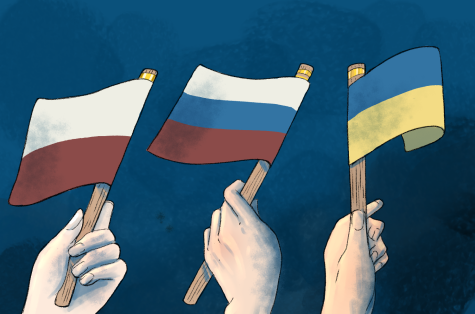Ukrainian, Russian and Polish students share worries for home
March 23, 2022

Yelizaveta Yuvkhimenko, a sophomore cinema and television arts major, spent a couple weeks without sleeping or eating much after Russian troops invaded Ukraine near the end of February.
She is worried about her friends and family in Ukraine.
Yuvkhimenko was born and raised in Kyiv, Ukraine. She moved to Chicago five years ago with her parents.
On Feb. 24, Russian troops invaded Ukraine, in what Russian President Vladimir Putin called a “special military operation” to free the country from “Nazis and Banderites.” According to the United Nations, there have been 2,571 civilian casualties in the country — 977 killed and 1,594 injured — between Feb. 24 and midnight March 22 in Ukraine. NATO estimates that 7,000 to 15,000 Russian troops have been killed, according to the AP.
“There’s a lot of information about a lot of civilians that already [died], a lot of videos of screams, blood and it’s so painful to see,” Yuvkhimenko said. “All the times I’m watching [these videos], I’m trying to recognize [people]; I hope it’s not my [loved ones].”
Among other family members, Yuvkhimenko has a brother, Egor, who lives in Kharkiv, which is on the border between Russia and Ukraine. Yuvkhimenko said she and her family got Egor a car to leave the city, but he would not leave his apartment because he said the Russian military attacked every car outside his apartment.
Another loved one Yuvkhimenko is worried about is her grandmother, who lives in Kyiv by herself. Yuvkhimenko and her mom, who both live in Chicago, ask her grandma to stay at home, but she continues to go outside for chores or to breathe some fresh air.
Yuvkhimenko said her brother and grandmother have enough food to last them for the moment. She is sending humanitarian help to her family and people in need in Ukraine through her church.
Bordering countries like Poland are offering shelter, medical help and food for people escaping from Ukraine. More than 2.1 million Ukrainian people have fled to Poland since the Russian invasion, according to the BBC.
Ksymena Pawlowicz, a junior public relations major, is an international student from Warsaw, Poland. She has friends in Ukraine who escaped to Poland and were helped by volunteers with food and medication.
One of these volunteers is Pawlowicz’s older brother who works with the Territorial Defense Force. He picks up people from the Polish-Ukrainian border and takes them to families willing to host them.
Pawlowicz’s brother has driven 20 women with 16 children, she said. One of these women had a sick child, who was taken straight to the hospital instead of a shelter.
“I’m very scared and uncertain [with] what’s going to happen next, and I feel very empathetic towards [Ukrainian] people,” Pawlowicz said. “I wish I was just there to help … even if it’s emotional, or just giving them hot tea or helping them get somewhere like many Polish people do.”
The European Union, the United States and other countries have enforced sanctions and penalties against Russia for violating international law. Several large American companies have discontinued their services, from movie releases in theatres to payment systems like Apple Pay. The U.S. banned transactions with the Russian central bank. This made it impossible for international Russian students to receive money from home.
One of these international students is Anton Kharitonov, a first-year communication major from Irkutsk, Russia. He said he was lucky he already paid for the Spring 2022 semester, but withdrawing all of the money from his Russian debit card in batches of $600 for living expenses was not how he envisioned his first year of college.
Although not comparable to deaths and suffering in Ukraine, Russian citizens are going through economic hardships. Thousands of Russian citizens have been arrested in anti-war protests.
On Feb. 27 International Student and Scholar Services sent out an email to Ukrainian and Russian students listing support Columbia is offering. The list included counseling services, Columbia Central’s email if students have concerns about tuition payments and an economic hardship work permit.
The economic hardship work permit authorizes international students to work outside of the school for 20 hours per week. To qualify, a student must have completed a full academic year and prove economic hardship via a written statement explaining their monetary challenges that have resulted from the situation. The application process can take up to 90 days.
Columbia has six Ukrainian and seven Russian international students, according to Clare Lake, director of International Student and Scholar Services, but he added that these numbers do not account for students who have dual citizenship in the U.S. in either of these countries, or those with close familial ties.
Kharitonov said no matter how many sanctions are imposed on Russia and how inconvenient life gets there, it is nothing compared to what people are experiencing in Ukraine.
“I’m literally speechless. I don’t even know what to think about this whole situation,” Kharitonov said.
Kharitonov is not employed and is getting financial support from his parents. Because he is a first-year student, he can not apply for economic hardship work authorization. Kharitonov is planning to rent an apartment to stay in Chicago for the summer and said he has enough money for the time being.
For the first time in several weeks, Yuvkhimenko has finally started getting a full night of sleep. She said she has been inspired to create motivational videos for Ukrainians.
“I started to trust God more,” she said. “I realized that even the war is at His hands and control. The area where my loved ones and family lives became quieter, and we [Ukrainians] started to win. Because of that it gave me more confidence and peace.”
Yuvkhimenko is still behind on many assignments but said her professors are being understanding.
Students affected can utilize resources provided by members of the Student Government Association and can contact them for additional support.







